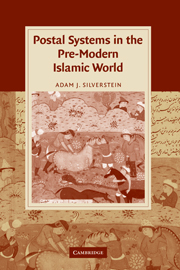Book contents
- Frontmatter
- Contents
- List of maps
- Acknowledgements
- List of abbreviations
- Introduction
- PART I THE PRE-ISLAMIC BACKGROUND
- PART II CONQUEST AND CENTRALISATION – THE ARABS
- PART III CONQUEST AND CENTRALISATION – THE MONGOLS
- Conclusions
- Appendix: distances and speeds of the Barīd
- Bibliography
- Index
- Cambridge Studies in Islamic Civilization
Introduction
Published online by Cambridge University Press: 18 July 2009
- Frontmatter
- Contents
- List of maps
- Acknowledgements
- List of abbreviations
- Introduction
- PART I THE PRE-ISLAMIC BACKGROUND
- PART II CONQUEST AND CENTRALISATION – THE ARABS
- PART III CONQUEST AND CENTRALISATION – THE MONGOLS
- Conclusions
- Appendix: distances and speeds of the Barīd
- Bibliography
- Index
- Cambridge Studies in Islamic Civilization
Summary
True to its title, this book is about postal systems in the pre-modern Islamic world. Although the terms ‘postal system’, ‘pre-modern’, and ‘Islamic world’ may seem self-explanatory, they deserve our attention here nonetheless, for they can be deceptively ambiguous.
Postal systems of the sort described in this book differ from modern ones in three ways. First, a modern postal system is defined by its role as an organisation that transports items for a fee. Pre-modern systems, by contrast, were defined by their method of transportation. The term ‘postal’ refers to the fact that people and riding-mounts were posted at convenient intervals along a route in order to allow couriers to rest periodically and obtain fresh mounts for the next leg of their journey. Hence, whereas modern postal systems can deliver mail by aeroplane, ship, or road, pre-modern systems were – strictly speaking – exclusively road-based networks of mounted couriers.
Second, owing to the fact that pre-modern postal systems were not defined by their function, they served in a number of capacities that would not be expected of their modern counterparts. For instance, whereas in the pre-modern world privileged people such as envoys and ambassadors could be transported to their destination by post, in the modern world such practices would probably be considered a moderate form of torture rather than a privilege.
- Type
- Chapter
- Information
- Postal Systems in the Pre-Modern Islamic World , pp. 1 - 6Publisher: Cambridge University PressPrint publication year: 2007

